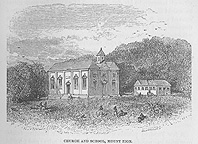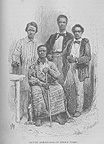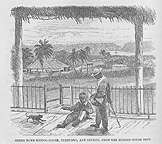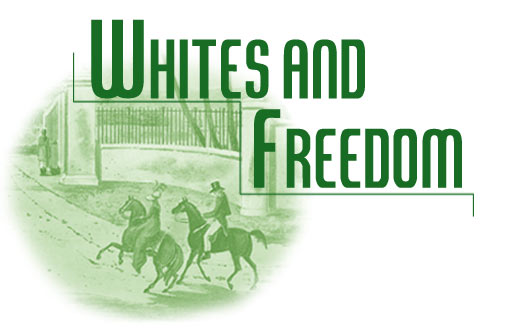
Protestant
missionaries came to the Caribbean in the mid 1700’s and remained throughout the late 1800’s.
Very early, they began preaching the gospel to the slaves and
tirelessly attempted to bring change to the cruel situation in the
plantations. They were present during apprenticeship and especially
dominant during the period of emancipation. The missionaries had the
goal of bringing freedom to the slaves, but most of all hope. That
hope came in the means of Christianity. The majority of them were
of Baptist and Methodist missions and mainly from the United Kingdom. Many groups of men and women also
fought hard for the cause of freedom, especially in Britain itself. Abolitionists, both religious, and secular,
were particularly important in that process. However the missionaries
were more directly involved in the lives of the emancipated people.
“Being wholly independent of local influence, the missionaries were
almost the only individuals on the island who dared interfere between
the oppressor and the oppressed.”
[1]
We cannot believe that their intentions were always
in the interests of freedom, as the missionaries also stood to benefit
from emancipation. They gained a large following in their churches,
filled up schools and communities that were tied to the missions and
they were able to expand themselves beyond the West
Indies.
that process. However the missionaries
were more directly involved in the lives of the emancipated people.
“Being wholly independent of local influence, the missionaries were
almost the only individuals on the island who dared interfere between
the oppressor and the oppressed.”
[1]
We cannot believe that their intentions were always
in the interests of freedom, as the missionaries also stood to benefit
from emancipation. They gained a large following in their churches,
filled up schools and communities that were tied to the missions and
they were able to expand themselves beyond the West
Indies.
Right
after emancipation took place the missionaries were used as a means
of communicating with the free people about what was going to be expected
from them as civilization was and the hardships that would follow.
There is no doubt that they were influential because the plantation
owners came to see them as a way of trying to keep the workers in
the plantations. The government was afraid of rioting or rebellion
and made it clear to them how they wanted them to behave.
Many
changes began to surface following the abolition of slavery. In some
cases, village prayer became an important part of the freemen’s daily
activities. “After the people became free their village prayer-meetings
could be better regulated than formerly. Early morning prayers were
also held in several villages, where the people used to be up at dawn,
and no longer being required to work before sunrise could profitably
spend half an hour in devotional exercises.”.
[2]
These meetings became a means of bringing the church
to the home and it also helped them to be more united. This unity
also encouraged them to keep records of important events like marriages,
baptisms and deaths. Both the missionaries and the formerly enslaved
desired to build new, free communities.
Another
desire of the missionaries, at least, was becoming part of the missions
that traveled to other places were slavery was either still active
or recently abolished. “The day of jubilee has come, and the arrangements
have been made for sending back her long exiled sons to the land of
her fathers that they may assist in diffusing throughout the African
continent the blessing of wisdom and of the fear of the Lord”.
[3]
Despite their efforts, white missionaries had experienced
only limited success in West
Africa
by 1834. The missionaries saw the Jamaicans as a sign of hope because
they seemed to be the perfect choice to help spread the gospel in
their still oppressed motherland.
In Jamaica, the missionaries wanted to replace
the colorful garments worn by the people of the island with more conservative
clothing. They were sometimes successful in this area, although other
observers often scoffed at the expensive clothing worn by the now
free Jamaicans on the Sabbath.
Christianity
promised ex-slaves equality, yet the majority could neither occupy
office, nor vote to select representatives.
Many missionaries were, at least in  the
early years after 1834 (emancipation) and 1838 (the end of apprenticeship)
unconcerned with such issues. Instead, they focused on forcing the former
slaves to meet a set of European-derived norms of behavior. The emancipated were called the peasantry of
Jamaica and they were threatened with the
wrath of God if they behaved in an “unchristian” manner. So now instead
of having the plantation masters over their shoulder, they were now
in some cases overseen by the church’s standards and the missionaries’
expectations. Still, the missionaries, though often arrogant
and insensitive, were driven by impulses different from those of the
planters: “The Jamaican churches in general are essentially missionary
churches and each individually of which they are composed regards
it as a sacred duty to do something to promote the glory of God in
the salvation of his fellow-men”.
[4]
the
early years after 1834 (emancipation) and 1838 (the end of apprenticeship)
unconcerned with such issues. Instead, they focused on forcing the former
slaves to meet a set of European-derived norms of behavior. The emancipated were called the peasantry of
Jamaica and they were threatened with the
wrath of God if they behaved in an “unchristian” manner. So now instead
of having the plantation masters over their shoulder, they were now
in some cases overseen by the church’s standards and the missionaries’
expectations. Still, the missionaries, though often arrogant
and insensitive, were driven by impulses different from those of the
planters: “The Jamaican churches in general are essentially missionary
churches and each individually of which they are composed regards
it as a sacred duty to do something to promote the glory of God in
the salvation of his fellow-men”.
[4]
Education
was another important factor tied to the church. For the missionaries it was a way to ensure
that true spiritual change existed, it also worked as a monitor on
belief, lifestyle and progress. Education was also tied closely to
religion because the students were mainly taught from the Bible, which
meant that most were now given the opportunity to read. There are
a  lot
of reasons why the missionaries supported education: perhaps to have
more church members, more ministers and money. Most schools were built
next to or in the vicinity of a church. The church members built these
schools and gave voluntary donations to support them.
“The opinion that religion consisted only in an occasional
attendance at the parish church is no longer general. It begins to
be regarded as a daily and personal concern, and has become the subject
of conversation in families where a little time ago it would have
been considered ridicule or contempt.”
[5]
The schools also introduced more sanitation and
gave girls at least some opportunity to seek an education as well.
lot
of reasons why the missionaries supported education: perhaps to have
more church members, more ministers and money. Most schools were built
next to or in the vicinity of a church. The church members built these
schools and gave voluntary donations to support them.
“The opinion that religion consisted only in an occasional
attendance at the parish church is no longer general. It begins to
be regarded as a daily and personal concern, and has become the subject
of conversation in families where a little time ago it would have
been considered ridicule or contempt.”
[5]
The schools also introduced more sanitation and
gave girls at least some opportunity to seek an education as well.
Now
that the Sabbath was accessible to all, missionaries expected all
to attend and make it their first priority. However, many people refused. Others were part of the church yet held on to
African-derived beliefs about such things as cures, remedies and superstitions.
Others moved away from the white people and the plantations
because they reminded them of their life as slaves.
This could be a result of these people being taken away from
their lives, forced into an inhumane life and now being pinned and
persuaded to a lifestyle that was not theirs. On the other hand these
people were exposed to Christianity from an early stage. So by the
time emancipation came to light, they were very shaped around this
concept because they had nothing else to look forward to. They embraced
religion as a support system; many were attracted to the message of
equality, which stood in such contrast to the life of slavery.
On the positive side of things, the missionaries helped those
who were worn out and hopeless to believe in something. They helped
them adjust to the real world, to celebrate and enjoy their freedom
in a nonviolent form. They brought them towards education and work
that would not be abused with its wages. The bible was no longer a
foreign book and lines of people waiting to attend services daily
replaced going to church on special occasions.

